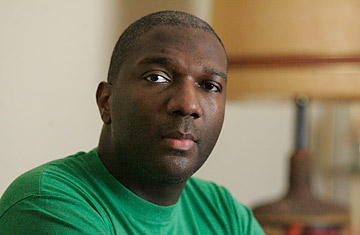
Alvin Greene, South Carolina Democratic candidate for the U.S. Senate, poses for a photo in Manning, S.C., on Wednesday, June 9
On the surface, everything seems off about Alvin Greene, the Democratic Party's newest Senate candidate in South Carolina. Never mind that there is no evidence that he ever campaigned for the primary election he won Tuesday, June 8, by 30,000 votes, taking 59% of the total. He was, by his own account, involuntarily discharged from the military because "it just wasn't working out." He lives on unemployment benefits with his father, and he is facing felony obscenity charges (which he denies) for allegedly showing online pornography to a stranger in a school library.
Then he opens his mouth, with a flag pin affixed to his ill-fitting lapel, and something still seems awry. "Someone has to be held accountable," he announced Thursday in an interview with a local television network. In a halting, mumbled cadence, he talks about "getting South Carolina back to work," while his campaign flyer mentions "better education for our children" and "justice in the judicial system." He says he will challenge the popular incumbent Republican Jim DeMint as an outsider with a career of military service. "I'm a 13-year military veteran," he says. "My opponent has no military experience."
Such utterances sound like fingernails on a chalkboard to national Democratic leaders who fear Greene's candidacy will become an unwelcome distraction in an already treacherous campaign year. "I don't know if he was a Republican plant. He was somebody's plant," announced South Carolina's most powerful Democrat, Representative James Clyburn, on Thursday. Both state and national Democrats were caught by surprise by Greene's victory.
For his part, Greene denies that anyone put him up to the race. He says he paid the $10,400 filing fee with his own money, though he has not been clear about how he saved that sum. When asked by a South Carolina television network if he had had "conversations with anybody" offering to help him out with the race, he said, "No, sir."
DeMint's campaign also scoffed at the idea that anybody would have bothered to pay Greene's filing fee, since DeMint's re-election is already considered a foregone conclusion and the state Democratic Party is largely in disarray. "Are you kidding? They are so low here, it really does not matter," DeMint consultant Warren Tompkins explained Friday in an e-mail to TIME. "The party is broke, and they are having trouble fielding candidates, plus they have a huge albatross named Obama around their neck."
But there are others in South Carolina, a sinkhole of political trickery, who suspect something may be amiss. Back in 1990, Republican consultant Rod Shealy recruited an unemployed black fisherman named Benjamin Hunt Jr. to run for lieut. governor, in an alleged scheme to fan fears among white voters. Shealy, whose sister was running for attorney general in the same election, denied that he was trying to stir up racial fears, but he later paid a fine for failing to report a $5,000 campaign contribution to Hunt, who was himself later convicted of drug offenses. According to witness testimony, Hunt was recruited by a sitting state congressman at Shealy's request. At the time, Hunt was in a wheelchair with a broken arm. He signed the papers making him a candidate in a Kmart parking lot.
Under South Carolina law, it is unlawful to give any candidate "inducement to file for or withdraw from candidacy for election." The penalty for giving money or "any other thing of value" to a candidate to manipulate candidacy is a fine of "not more than $10,000 or imprisoned for not more than one year." Shealy is still an active consultant in South Carolina politics, having just helped run the unsuccessful gubernatorial primary campaign for Andre Bauer, the state's current lieut. governor. Attempts to reach Shealy Friday were unsuccessful; his voice mailbox was full and no longer accepting messages.
Clyburn has asked for investigations into the possibility that Greene was induced to run. State Democratic Party chairwoman Carol Fowler told South Carolina's largest newspaper, the State, that she expected a Federal Election Commission investigation as well. "No one has provided us with any credible allegation or information at this time," says Gene McCaskill, the senior executive assistant in the South Carolina attorney general's office. If history has taught anything about South Carolina politics, it is that dirty tricks are more often the norm than the exception. But there is another lesson as well: rarely do the tricksters ever get umasked.
